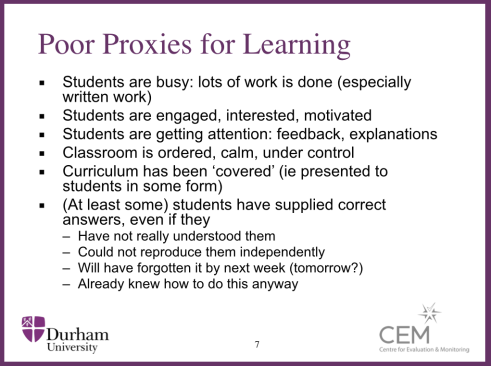I’ve long thought that one of the weakest proxy indicators of effective learning is engagement, and yet it’s a term persistently used by school leaders (and some researchers) as one of the most important measures of quality. In fact many of the things we’ve traditionally associated with effective teachers may not be indicative of students actually learning anything at all.
At the #ascl2015 conference last Friday, the always engaging Professor Rob Coe gave a talk entitled ‘From Evidence to Great Teaching’ and reiterated this claim. Take the following slide – How many ‘outstanding’ lessons have been awarded so based on this checklist?

Now these all seem like key elements of a successful classroom, so what’s the problem? and more specifically, why is engagement is such a poor proxy indicator – surely the busier they are, the more they are learning?
This paradox is explored by Graham Nuthall in his book ‘The Hidden Lives of Learners,’ (2007) in which he writes:
“Our research shows that students can be busiest and most involved with material they already know. In most of the classrooms we have studied, each student already knows about 40-50% of what the teacher is teaching.” p.24
Nuthall’s work shows that students are far more likely to get stuck into tasks they’re comfortable with and already know how to do as opposed to the more uncomfortable enterprise of grappling with uncertainty and indeterminate tasks. A good example of this as Alex Quigley has pointed out is that engagement in the form of the seemingly visible activity of highlighting is often “little more than colouring in.” Furthermore, teachers are more than happy to sanction that kind of stuff in the name of fulfilling that all important ‘engagement’ proxy indicator so prevalent in lesson observation forms.
The other difficulty is the now constant exhortation for students to be ‘motivated’ (often at the expense of subject knowledge and depth) but motivation in itself is not enough. Nuthall writes that:
“Learning requires motivation, but motivation does not necessarily lead to learning.”p.35
Motivation and engagement are vital elements in learning but it seems to be what they are used in conjunction with that determines impact. It is right to be motivating students but motivated to do what? If they are being motivated to do the types of tasks they already know how to do or focus on the mere performing of superficial tasks at the expense of the assimilation of complex knowledge then the whole enterprise may be a waste of time.
Learning is in many cases invisible as outlined many times by David Didau and is certainly not linear but rather more nebulous in actuality. As Prof. Coe reminds us, ‘learning happens when people have to think hard’ but unfortunately there is no easy way of measuring this, so what does he suggest is effective in terms of evidencing quality?
Ultimately he argues that it comes down to a more nuanced set of practitioner/student skills, habits and conditions that are very difficult to observe, never mind measure. Things like “selecting, integrating, orchestrating, adapting, monitoring, responding” and which are contingent on “context, history, personalities, relationships” and which all work together to create impact and initiate effective learning. So while engagement and motivation are important elements in learning they should be seen as part of a far more complex conglomerate of factors that traditional lesson observations have little hope of finding in a 20 min drive-by.
This is where a more robust climate of research and reflective practice can inform judgements. It’s true that more time for teachers to be critically reflective will improve judgements but we also need to be more explicit in precisely what it is we are looking for and accept that often the most apparent classroom element may also be the most misleading.
Slides: Prof. Rob Coe: From Evidence to Great Teaching ASCL 20 Mar 2015
Nuthall, Graham (2007). The Hidden Lives of Learners. Wellington: New Zealand Council for Educational Research Press
Leave a comment